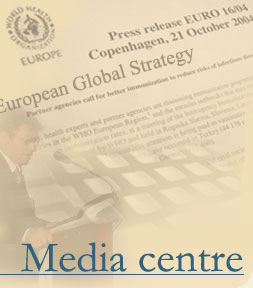European Mayors Act to Reduce Equity Gaps in Health
Copenhagen
On 10 June 2000, mayors and senior politicians from 41 cities across Europe will pledge to take specific action aimed at reducing the health gap between social groups in their cities. Coming at the midpoint of the WHO Healthy Cities Network’s third phase (1998-2002), the mayors’ statement will include a commitment to strategic planning for equity and calls for the active involvement of every sector in each city to contribute to health and identify ways to measure achievements.
"We welcome the mayors’ commitment to taking action to improve the quality of life for those most in need. Quality of life and health go hand in hand. No plan or strategy for health can be serious without systematically addressing poverty, vulnerability and access to care", stated Agis Tsouros of WHO, Coordinator, Division of Partnerships for Country Health Development.
The statement will be signed in Horsens, Denmark, where representatives from all 41 WHO Phase III Healthy Cities will be gathered on 7-10 June 2000. These cities represent the most advanced and committed cities in a wider Healthy Cities movement which includes over 1,000 cities and towns across Europe.
WHO Healthy Cities promotes comprehensive frameworks for understanding and responding to such complex issues as equity, the social determinants of health, community participation and healthy urban planning. WHO Healthy Cities has developed tools and guidance in addition to systematic short and long-term approaches for taking action for health and sustainable development.
On the agenda at the meeting in Horsens will be a review of the “City Health Development Plans”, aimed at providing a strategic basis for a broad range of partners and actors to work in a focused way for health, equity, sustainable development and human development. The meeting will also discuss the involvement of the business and education sectors and local communities in the work of Healthy Cities and the City Health Development Planning process, as well as mechanisms for demonstrating the impact of Healthy Cities through evaluation and monitoring.
Jostein Rovik, the mayor of Sandnes, Norway, highlights the important role of Healthy Cities for all cities: “We should be working actively to deal with the inequalities in Europe, we used to say we had equality in Norway, but now we are looking at this again. It is certainly true that we have no slum areas in our city, but we do still have vulnerable groups of citizens".
Vagn Ry Nielsen, the mayor of Horsens, a member city of the WHO Healthy Cities Network since it began in 1987, and home to the WHO Collaborating Centre for Healthy Cities Training, stated: "When signing the declaration on equity in health, politicians commit themselves to action". And with a healthy cities apparatus already in place, this action should come more quickly.
The Healthy Cities programme is led by the WHO European Centre for Urban Health within the WHO Regional Office for Europe in Copenhagen. The Centre’s primary goal is to strengthen WHO’s capacity to promote and stimulate action for health at the city and local level.
For more information, contact:
|
|
|

